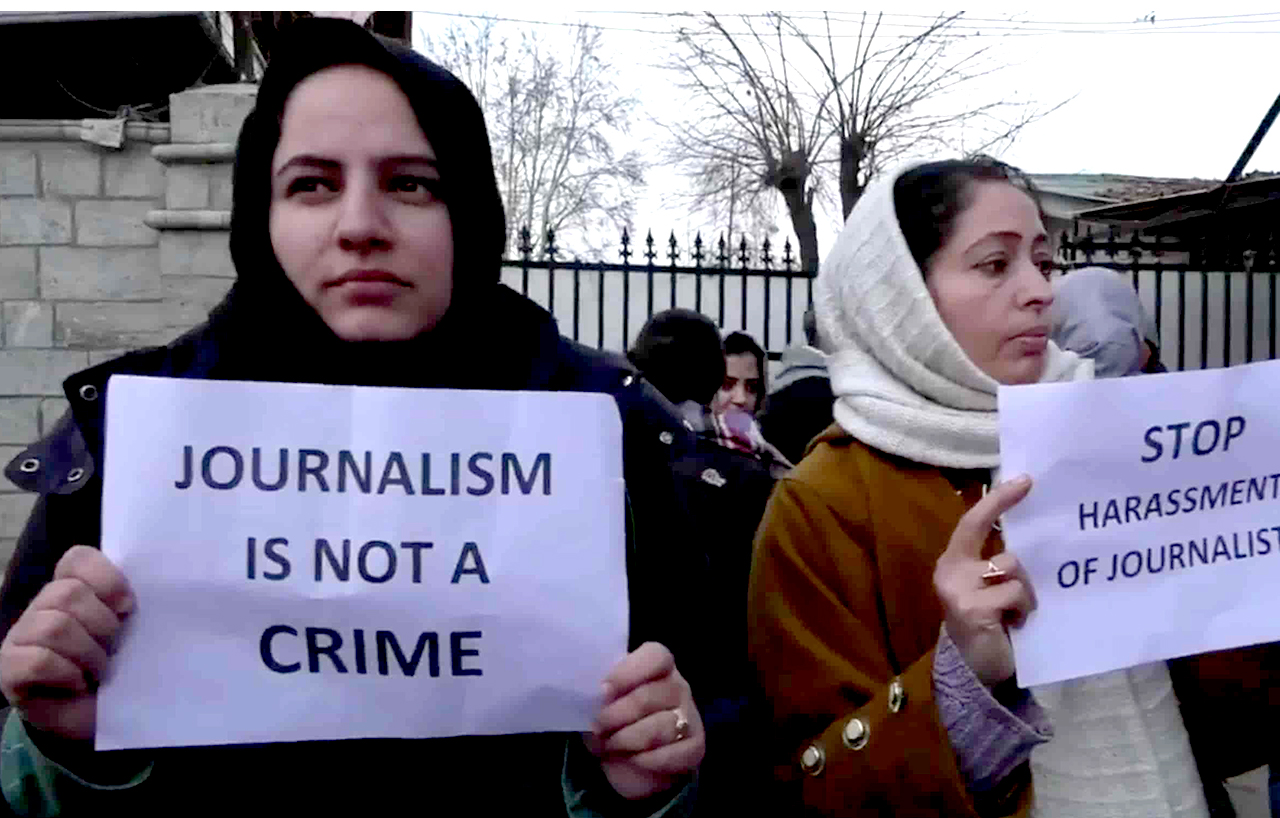In Kashmir journalists are under shadow of gun, harassment and intimidation. The recent arrest of Fahad Shah, editor of Kashmir Walla, under UAPA for posting ‘anti-national content’ on social media raises a debate about the fate of journalism in times of conflict. Shah was arrested on 4 February as he had uploaded Inayat Ahmad Mir’s family’s protest over the police’s claim that Mir was a “hybrid terrorist”—an unlisted and camouflaged militant—in the encounter that had happened in his house in Naira Pulwama on January 30, 2022.
People’s Union For Democratic (PUDR) has demanded unconditional release of Fahad Shah and other journalists in Kashmir. In a statement, the human right and civil liberty organisation said:
… if the police are able to discern ‘intention’ in social media posts and in journalistic pieces, then fundamental freedoms have no meaning outside of what the police feels and believes.
Fahad Shah, editor of Kashmir Walla, was arrest on February 4, 2022, under Section 13 of UAPA and Section 124 A and 505 of IPC for ‘uploading anti-national content’ on social media. PUDR stated that by treating journalism and social media uploads as law and order cases and targeting journalist in conflict zones like Kashmir for objective reportage, the constitutionally protected activities of citizens are being criminalized by the government.
Earlier, in April 2021, the Editors Guild of India had expressed “shock and concern” about police action against Kashmiri journalists in the wake of the arrest of Masrat Zahra and Peerzada Ashiq. The Editors Guild has described the police’s decision to invoke the UAPA, an anti-terrorism law, against Zahra as a “gross misuse of power” and an attempt to terrorize media.
PUDR have appealed to the political opposition to argue for the repeal of undemocratic laws like UAPA and to ensure that a democratic polity does not become a police property.
The statement released by PUDR is given below.
February 7, 2022
The recent arrest of Fahad Shah, editor of Kashmir Walla, under S 13 of UAPA and S 124 A and 505 of IPC for ‘uploading anti-national content’ raises a debate about the fate of journalism in times of conflict. Shah was arrested as he had uploaded Inayat Ahmad Mir’s family’s protest over the police’s claim that Mir was a “hybrid terrorist”—an unlisted and camouflaged militant—in the encounter that had happened in his house in Naira Pulwama on January 30, 2022.
Shah’s arrest on February 4, 2022, comes in the wake of arrests and harassment that journalists in Kashmir have faced in the last three years.
Qazi Shibli, the editor of Kashmiriyat, was detained under PSA, between July 2019 and April 2020, again detained for 18 days from July 31, 2020 by the cybercrime division of the J&K police.
On August 6, 2021, the police broke into his house and raided the premises without a warrant. In September 2020, independent journalist, Auqib Javeed, found himself at the mercy of the cyber wing of the J&K police after having written on harassment that internet users in Kashmir face at the hands of the police.
Peerzada Ashiq of The Hindu was questioned for ‘fake news’ in April 2020, and Masrat Zahra and Gowhar Geelani, both independent journalists, were booked under UAPA in the same month.
A few weeks before Fahad Shah’s arrest, his colleague Sajad Gul was first arrested by the army on January 5, 2022, at Bandipora for uploading a protest video of the killing of LeT commander, Salim Parry in an encounter on January 3 in Srinagar. Gul was granted bail but was arrested the next day under PSA, on January 16, 2022, on charges of promoting anti-nationalism.
In almost each of these instances, the police have claimed that in the “garb of journalism” these individuals have actively spread “disinformation and false narratives” to create “ill will” against the government by provoking the general masses to resort to violence and disturb public peace and tranquility.
In the case of Fahad Shah’s ‘offence’, that of uploading a protest video of the family of a slain teenager, a few points need to be reiterated. One, presenting both sides of the story, as Shah does, does not tantamount to glorification of terrorism; it is a part of objective reportage. Second, the airing of the grievances of the protesting families does not promote terrorism; instead, it draws attention to the ‘hurt sentiments’ of the grieving Kashmiri Muslim families. Third, by treating journalism and social media uploads as law and order cases, the UAPA has once again proven itself to be an unlawful law as its definitional vagueness allows constitutionally protected activities to be criminalized. Four, if the police are able to discern ‘intention’ in social media posts and in journalistic pieces, then fundamental freedoms have no meaning outside of what the police feels and believes.
It is time for the political opposition to argue for the repeal of undemocratic laws and to ensure that a democratic polity does not become a police property.
PUDR demands
- Unconditional release of Fahad Shah and other journalists
- Repeal of UAPA
- Removal of S. 124 A of the IPC
Radhika Chitkara and Deepika Tandon
Secretaries PUDR
pudr@pudr.org

